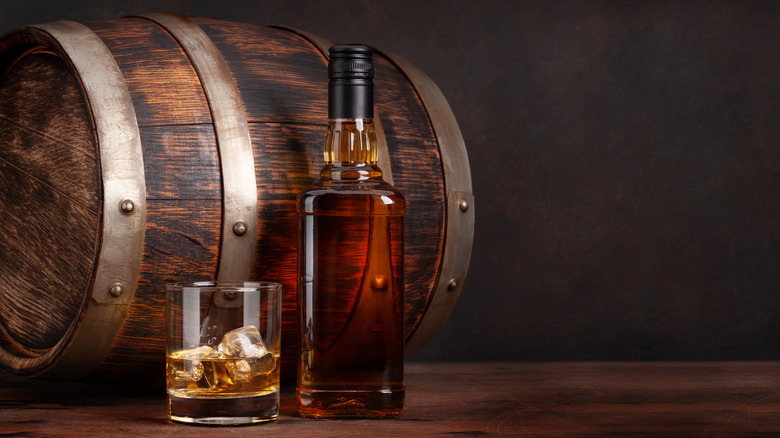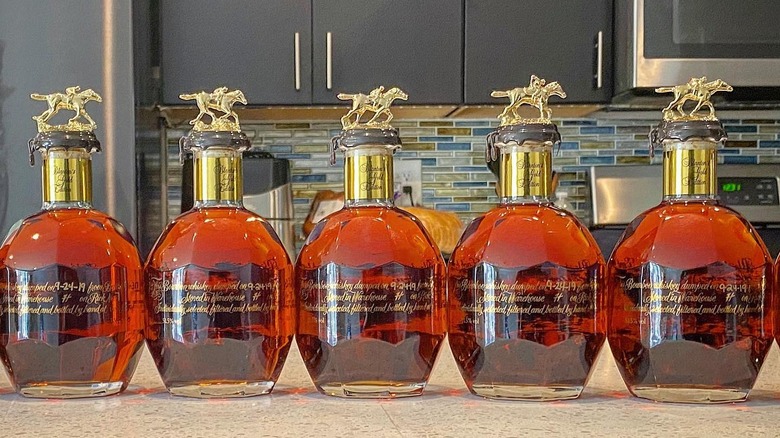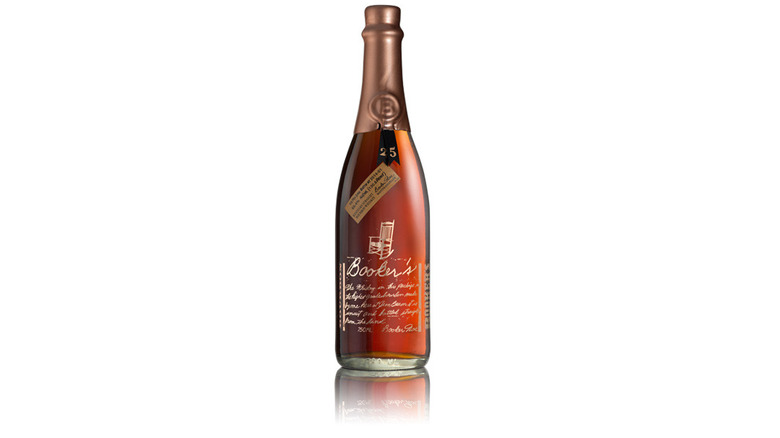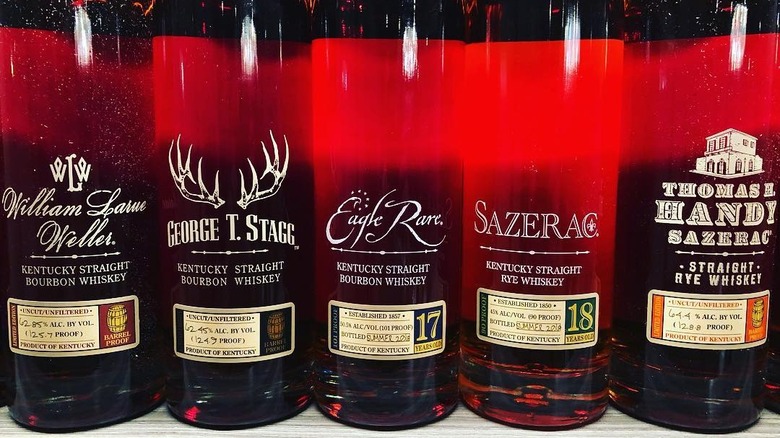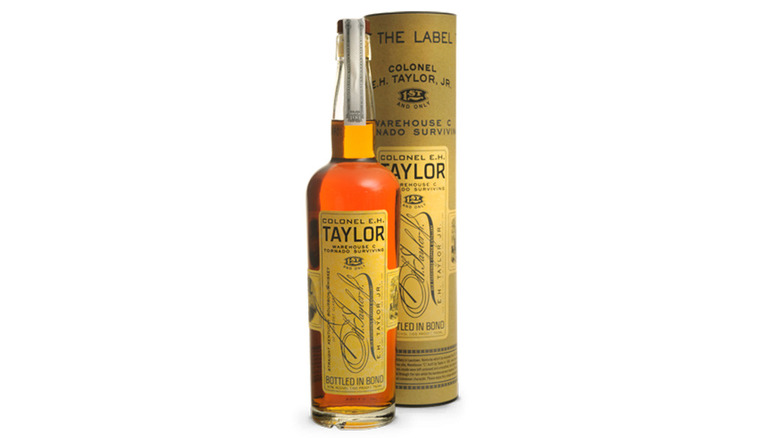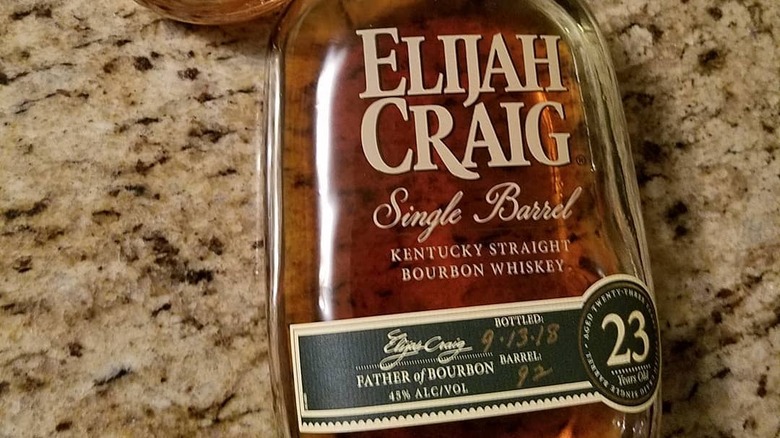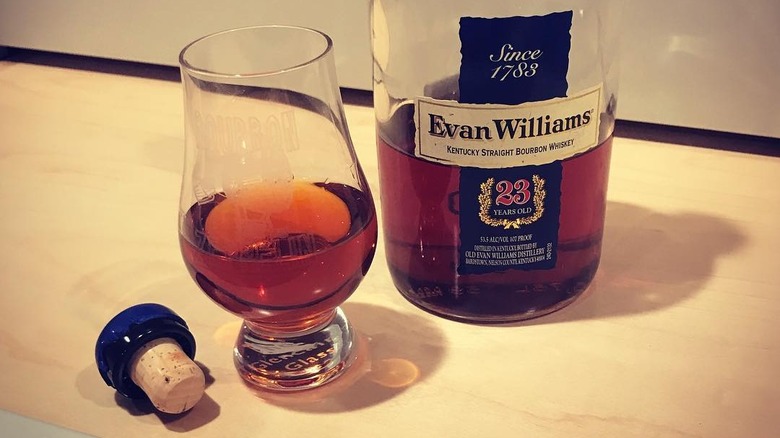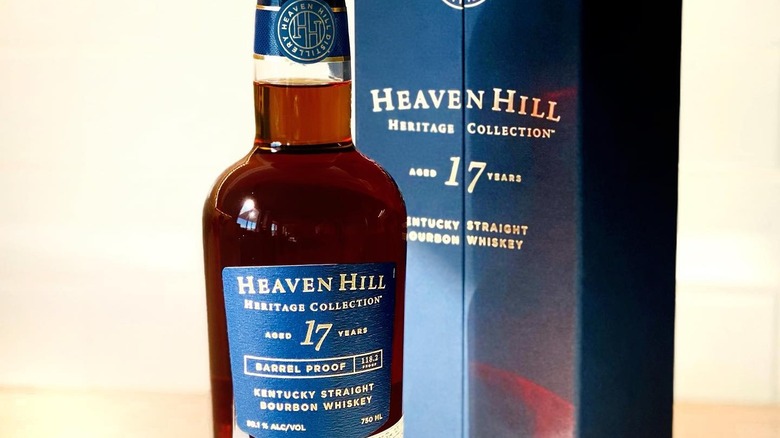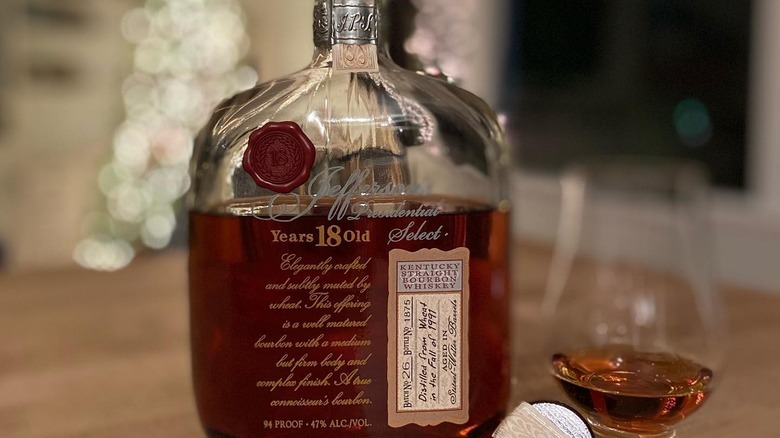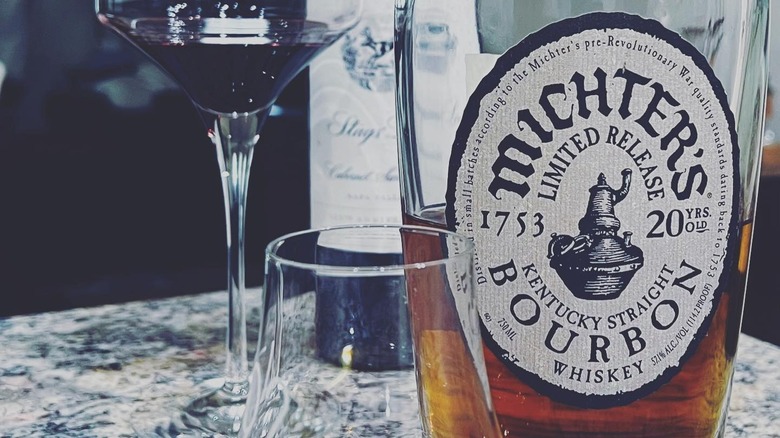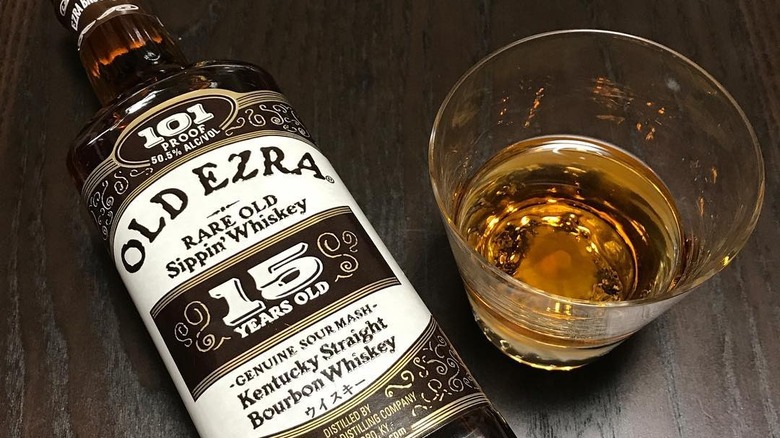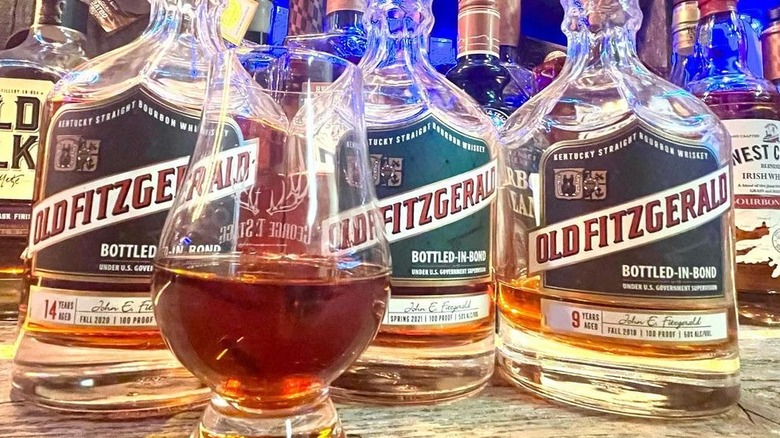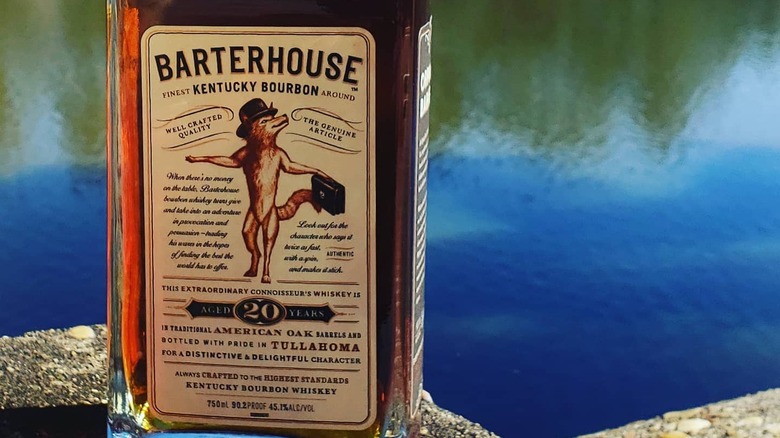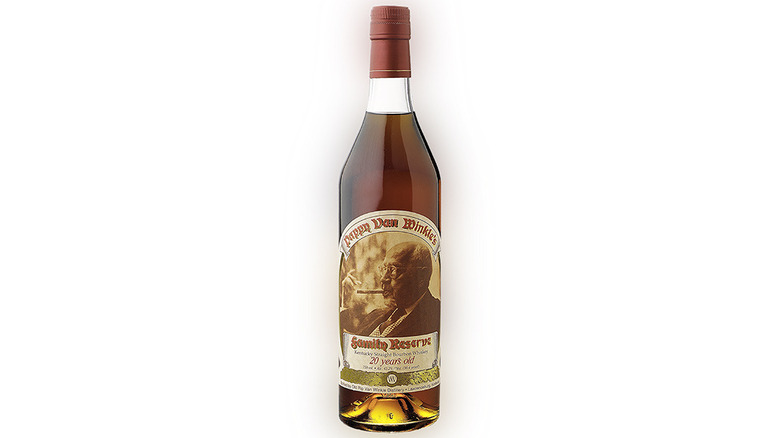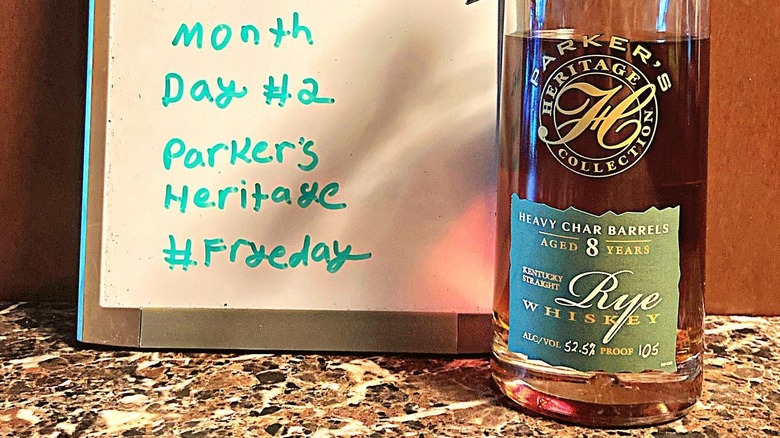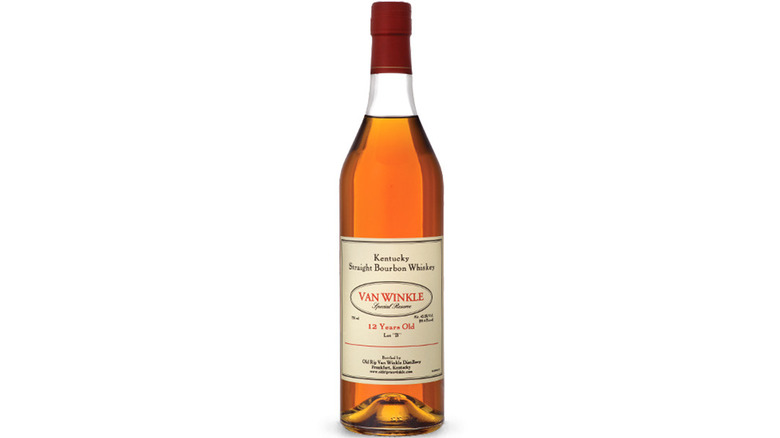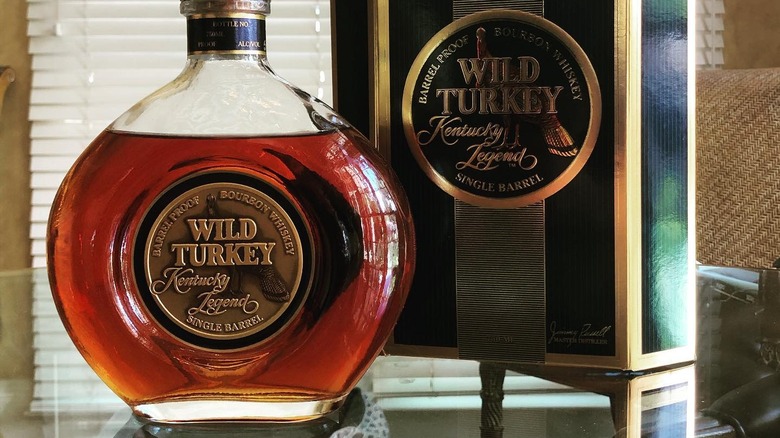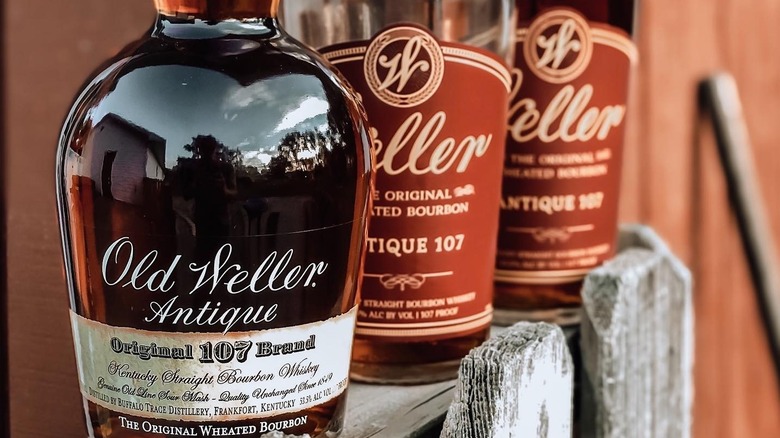16 Rare & Allocated Bourbons Every Collector Needs
Some people curate their bar in order to drink well. Others chase rare bourbons simply to have and hold and appreciate. Still, more see bourbon only as a new form of investment, and their ranks have spun out the day-trading flippers who chase commodities to resell. True collectors usually scorn their role in driving up prices but also utilize their services to complete a passion gallery.
Bourbon should be enjoyable no matter what motivates you to chase those luxe bottles, so here's our guide to collectible bottles for any motive or budget. With the murkiness of the (illegal!) bourbon secondary market, you'll see price fluctuations from store to the informed collector to the uninformed rich guy overpaying for a bottle of Pappy Van Winkle 23-Year by several thousand. In a way, that's good news because it means that finding the labels on this list is as much a matter of luck as it is wealth. So whether you're starting your collection, toasting success, or assembling a library, here are the bottles to grab, even if they're slowly becoming the rarest bourbons in the world with every special occasion's pour.
Blanton's Gold Edition
Even regular Blanton's — the beloved Kentucky originator of single-barrel bourbon — is a search and an expenditure. For years your best chance of acquiring the brand's second release, 103-proof Gold Edition, was to fly to Japan, according to Caskers. Fortunately for domestic drinkers, The Bourbon Road reports this previously international-only release is easier hunting after the 2020 decision to let a few bottles remain in America each year. If you do spot this world-traveling whiskey, seize it, but you'll shell out a few hundos on either side of the Pacific. It's not cheap to mount this expedition for gold, but the spicy, smoky, earthy, sour, and sweet flavors mingling on your tongue make it worth the hunt.
Booker's 10-Year-Old 25th Anniversary Edition
Not to be confused with its 10th-anniversary release, Booker's 10-year-aged bourbon is a much-revered magnum opus from Jim Beam master distiller Booker Noe II (the historical Jim Beam's grandson), who had been passing out this private reserve to loved ones. Having devised the concept of small-batch while simultaneously popularizing barrel strength in this label, he retired on top.
Any expression of this uncut and unfiltered cask-proof whiskey is welcome, but this bottle's particularly meaningful. While most Booker's barrels age six to eight years before bottling, these sat for a decade, and The Bourbon Review reports the 2003 casks used were among the last Noe ever selected as distiller emeritus. That makes this Booker's the last one that's really Booker's. His son and successor, Fred Noe, dedicated this bottling in his honor, adding an emotional incentive. At 1,000 cases produced, you'll need patience to find it, but a few high-end shops like LA's Flask Fine Wine will put it in your hands if the price is right.
Buffalo Trace Antique Collection
Is it even fair to lump these bottles together when any one of them could have topped a list of recommendations? Exquisite ryes bookend the trinity of Buffalo Trace's biggest-name bourbons; George T. Stagg, William Larue Weller, and Eagle Rare 17-Year-Old are each a no-brainer gift for our dearest friends on their greatest days. Fully assembled, the Buffalo Trace Antique Collection is an investment piece that appreciates faster than most blue chip stocks, even if it does cap out at a certain level. You may have tasted those labels; you have only ever dreamed of these expressions. While Buffalo Trace doesn't release the mash bill on the BTAC beauties, it does provide a one-sheet on the grains, process, and aging abode in its warehouses for each release.
E.H. Taylor, Jr. Warehouse C Tornado Surviving
They couldn't replicate this expression if they tried. When a 2006 tornado raised the roof on Buffalo Trace's Warehouse C, it left this batch of E.H. Taylor exposed to the elements. All summer, the climate naturally heat-cycled the aging barrels in what The Bourbon Concierge calls ultimate evaporation. While you might find it for four figures after deep searching, Wine Searcher puts it in the $12,000 range with an absolute floor of 10 grand.
Malt Review decries Buffalo Trace's stunt labels and marks Tornado findable at $3,000 or so. But those with the good taste to recognize the Kentucky Colonel's quality lineup will dream of buying this crown jewel the day they win the Pick 5. Just don't make the mistake of overpaying for Warehouse C when you actually want Warehouse C Tornado Surviving. That rickhouse is good but not magical.
Elijah Craig 23-Year Single Barrel
Heaven Hill bills Elijah Craig as the original small-batch bourbon, and we'll let them duke it out with Booker's, but Elijah Craig was the first to char oak barrels. This brand knows the limits of what oak can — or shouldn't — do, and Elijah Craig 23 takes everything a whiskey should be to the edge of respectability. Frootbat reviewers all say how smoothly it sips, though some respected reviewers like Breaking Bourbon feel it might have oak-verstayed its welcome.
Elijah Craig 23 eludes over-oaking according to Cask Cartel, though, as its resounding tannins support familiar flavors (vanilla, cinnamon, orange peel, you can probably guess most of this drink's personality). Aged in temperate conditions for a slow and steady victory, it's best neat if you can bear to crack open a bottle as pricey as a new laptop. (Spirits Review recommends you don't.)
If that gives you pause, Elijah Craig landed on Mashed's list of Best Bourbons to Try in 2022 twice, so you've got more affordable options to choose from.
Evan Williams 23-Year Straight
Speaking of 23 years, here's underrated workhorse Evan Williams. Longer aging doesn't automatically mean higher quality, and many cask-aged bourbons emerge over-oaked. Sure, older whiskeys exist, but they tend to be nuanced Scotch whisky from milder barrels, and few bourbons this old are bottled straight whiskeys.
It's priced equivalently with its Heaven Hill buddy Elijah Craig 23-Year, but Evan is the better option if you intend to drink it. Master of Malt likes its chocolate-and-cherry nose, while Breaking Bourbon notes the two whiskeys share a mashbill. Instead of hunting this cross-country, spend those dollars on a vacation to Louisville and buy it at the distillery while having a week of fun. Just call first to see if it's in stock.
Heaven Hill Heritage 17-Year-Old Barrel Proof
You could assemble an enviable collection using only Heaven Hill flagship rarities, and a great place to start is this new line. The 17-Year-Old Barrel Proof is the first Heaven Hill Heritage expression. Reviews are so strong you may want to buy a second one and sacrifice the sealed-bottle resale value. According to Breaking Bourbon this smells like a fruitcake, tastes like a saloon, and finishes as three kinds of dark sugar.
In the other tumbler, Wine Searcher says its value has already blown up from the MSRP of $275 to an average of $1900! Even accounting for launch heat, consider Heaven Hill uses six mashbills. It's reasonable to expect each to join the Heritage banner. If they all match this quality, you can pounce on the next bottle and watch it soar. Heritage could end up Bardstown's answer to Frankfort's BTAC.
Jefferson's Presidential Select 18-Year-Old Straight
Bourbonites swarm old Stitzel-Weller artifacts like 1992 was the end of civilization. (NC Whiskey has some good reading if you want details on the wild hunt.) The location's since resumed distillation, says Sipping History, but there will always be diehards who claim it's just not the same.
Some original stock resides in Jefferson's Presidential Select 18-Year-Old. Jefferson's doesn't distill, as The Whisky Vault explains, but makes its own blends. We recommended their Aged at Sea for our Best American Whiskey Brands ranking, but the Presidential Select is landlubbing Stitzel-Weller surplus from 1991. Ages run from 16 to 30 years, with the 17 being particularly fine. If Wine Searcher's average $3781 price keeps that one a pipe dream, you won't be crying into your 18 either at two grand. Though if you do, a few drops of water are recommended to open this one up. Now it's got all the brine the ocean never got the chance to lend it.
Michter's 20-Year Kentucky Straight
Men's Journal called the 2021 edition of Michter's 20-Year Kentucky Straight Bourbon a capstone to a triumphant year, noting Michter's doesn't release this one unless it earns its wings. The very limited edition bottles (fewer than 600 last year) hit stores at $750 and touched the sun almost immediately in the secondary market. If you'd bought this as a Christmas gift, it would have doubled in value before they unwrapped it. In the half-hour between opening the bottle and finishing your glass, it quite literally becomes too rich for your blood.
So yeah, acquisition is pricey, but a new debut's guaranteed to appreciate. Scorn flippers, sure, but a turnaround bottle can build out half your whiskey wishlist. For $750, you can have one bottle sitting untouched or dozens of beloved $200 ones funded by passing that hot tater.
Old Ezra 101 15-Year
Old Ezra 101 defies sourced-whiskey scoffers. It's a sour mash, 15-year, straight bourbon at 101 proof: all very desirable attributes. Though formerly an 11-year, the standard 101 bottle is now seven-year barrel strength, making the 15 a special product. Must Have Malts says it's another Japanese release that's picked up heat stateside.
The Whisky Jug records Ezra bourbons as Heaven Hill productions until 2018, when parent company Luxco constructed its own distillery right in Bardstown, KY. And that was purchased just last year by MGP, famous for producing sourced spirits for other brands, including all of Ezra's rye. So having found a home and a family, this formerly sourced whiskey might end up the source for others.
History lesson aside, this bottle is dauntingly great. As an overlooked '80s bottle, it has dust appeal combined with pearly shine. It's praised by sites like Booze World in its landfall market. And Whisky Advocate says Ezra's distribution network positions MGP to boost historically quiet brands. So you might soon see this label in the company of Jim, Jack, and Evan, pushing pre-fame collectible bottles much higher.
Old Fitzgerald Bottled-in-Bond
It is wild that this handle is the only BiB statement on the list — it makes you wonder if QC corrals any head-turning characteristics. Anyway, here's your wedding gift for your friend who taught you the glories of wheated bourbons. Old Fitzgerald BiB hovers around $900 but has ages and prices for most budgets. The 15, 16, and this spring's debut of the first Old Fitzgerald 17-Year are all particularly well-regarded. In 2017, Breaking Bourbon reported classic Old Fitzgerald was phased into Larceny. These luxury decanters reinvented the line in semi-annual releases the next year, though not, as you might guess, in ever-increasing ages from some fantastic mother batch. Breaking Bourbon again reported only 10 were planned, which, if true, would make right now your last shot at an MSRP bottle.
The Whiskey Shelf emphatically recommends the 15 over Van Winkle 12-Year purely on taste and considering the price differences, that's saying a lot.
Orphan Barrel Barterhouse 20-Year
It's Stitzel-Weller creating a stir again. Bourbon Culture put paid to this brand's myth of unearthed caskings: New Bernheim distillate aged at S-W became Diageo property by way of purchasing Bulleit. The ancient bourbon with no label to call its own became Orphan Barrel.
Its first expression was Barterhouse, which Bourbon Culture does not recommend you drink, though Whiskey Consensus says you should. Why not set a winning bid on this $600 bottle, then go out to the bar while you wait for the auction to end? Try an affordable pour for yourself and decide if you're going to sip it or sell it when it arrives. If you ask us, $600 for a whiskey with middling reviews is really $25 for a whiskey and $575 for a resale bottle that will net reliable profit for buying better bourbons.
Pappy Van Winkle's 20-Year Family Reserve Best
Here it is — the top-rated whiskey in history, according to Wooden Cork and everyone else. So here's the deal: The whiskey is great, though not worth several thousand dollars. The investment piece may well be, provided you find a rich buyer with more money than knowledge to pay the price of a new Harley for it. Perhaps there's a nightclub that will buy it off you for an insane bottle service resale? Uproxx sings its praises while also saying its value remains in the Benjamins.
What's left to say? If you find it for less than a couple of grand, you can turn a profit. For all the griping about how this bottle kickstarted price inflation in the entire bourbon market, every one of your friends will still stare in awe at this centerpiece ruling over your collection.
Parker's Heritage Collection
Parker Beam (of that Beam heritage) was whiskey royalty. When the sixth-generation master distiller selected the barrels Heaven Hill used to honor his work in this 2007 debut, he possessed generational wisdom. You might consider this the even-more premium spiritual (and literal) cousin to Booker's. Its MSRP is $200, but releases go up in value by that or more each year. Earlier editions are now several thousand, while more recent ones hover around the thousand mark.
Pounce if you see it; not every year brings us Parker's Heritage. You can't pick a bad one — although reviewers tend to find the 12th edition a bit of an acquired, if well-regarded, taste. You might start there if you want an affordable entry; you won't feel bad about opening.
Pair this whiskey with a donation to ALS research; it's a disease Beam battled, and the line donates proceeds to charities fighting it.
Van Winkle Special Reserve 12-Year
Yeah yeah, everyone wants a bottle of Pappy Van Winkle. It's a quality whiskey driven to flex and flash overprices by a market gone mad. That associative power has spread to the rest of the Van Winkle line and anything that ever shared oxygen with the Stitzel-Weller legend (see Old Fitzgerald, etc.)
But turn your eyeballs to the near end of the spectrum: Van Winkle Family Reserve 12 isn't a Pappy but is a way to get a lot of the benefits at, let's not say, "a more reasonable price," but certainly less extravagant. You could crack this one open at college graduation or the birth of your child without the guilt of drinking away a semester's tuition. Fair warning: The Whiskey Shelf actually prefers Old Rip Van Winkle 10-Year to this one, but both draw benefits of Pappymania for about the same price point: might as well get the more impressive age. At this value gulf between experience and cost, you're buying exorbitance, not flavor.
Wild Turkey Kentucky Legend
Not the most expensive Wild Turkey, but perhaps the most pursued, you'll find no mention of Kentucky Legend on its website. What we know about "The Donut," as this disc-shaped bottle is affectionately nicknamed, is it's a Bavarian buffet of dessert flavors. Reddit says it was a late '90s release that only recently spiraled in price (Wine Searcher only lists one for a couple of grand, though its average is still in the mid-hundreds, so you might still find a steal.) It's Wild Turkey's first and, according to Rare Bird 101, only known single-barrel straight bourbon at barrel strength, meaning this particular cask must have really been something to impress Jimmy Russell into saying, "Don't change a thing!"
Rare Bird 101 also cautions against confusing the (prevalently Japanese) international release of Kentucky Legend 101 with barrel-proof domestic ones, which land in the mid-to-upper 110s. (Worldwide Whiskies doesn't distinguish its ABV, so it's a good warning.) Campari's producing more Kentucky Legend, so you're gambling: will new releases quell the market's thirst for must-drink Donut? Or will these very limited releases galvanize the casuals into seeking dusty originals?
W.L. Weller Old Weller Antique 7 Year Old 107
Gear Patrol confirmed with Buffalo Trace that its wheated bourbons all share a mash bill and batches, making Weller an aging location away from being "Old Rip Van Winkle, Jr." While longtime drinkers bemoan the outsized inflation of the former "poor man's Pappy," at least the Weller line received overdue attention. When Seattle Spirits Society said in 2016 that the Antique was somewhat hard to find, it needed wider distribution. These days, it's rare because it gets bought up everywhere.
Older bottlings, even recent ones, command hundreds or even four figures, depending on the year and single-barrel releases. If you're looking to mount a collector's bottle on your shelf, get your hands on 2007 or 2016. If you just want a taste akin to Old Rip Van Winkle, a recent expression will make you more than half as happy for less than a tenth of the price. So you can buy one and try one without changing your budget much at all.
Despite its rising price, try it with our 20 Best Drinks to Mix With Whiskey rankings. Blasphemous? No less an authority than Larry Rice of Louisville, KY's The Silver Dollar, told Thrillist that he uses Weller Antique to make his bar's mint juleps memorable.
